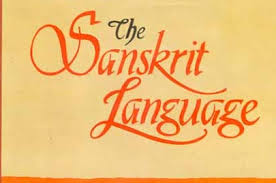Sanskrit Challenge: July 2014

In the midst of our summer fun, we will keep the brain active and learn a few new words / philosophical concepts.
Every Language is Unique: Here we have to keep in mind that every language of the world is the medium of human expression. Some languages we may know and others not, but all are intrinsic aspects of our universal humanity. Each language also reflects the insights, interests, and knowledge of a particular community. Those people created words based on their life experience, environment, and thoughts. So each language has a special purpose.
Clearly, Sanskrit best reflects the teachings of yoga. Yoga itself is a Sanskrit word meaning to yoke, and is commonly defined as union.
The Challenge: This will be an organic challenge – each week I will present different aspects of the Sanskrit language and how it relates with our yoga practice. And I will also field whatever questions you have about Sanskrit. By this way our challenge will grow and develop each from week to week. Some possible topics include sutras, shlokas, and more…
Two Terms for Week #1:
Asana: Literally means ‘seat’ or ‘position comfortably held. Today asanas refer to the vast array of 50,000 physical yoga postures that come under the branch of yoga known as hatha yoga. Asanas are glandular based exercises that regulate the entire physical body and mental arena by balancing the glandular secretions. For this reason asanas are equally effective in preventing and curing bodily diseases as well as creating a state of mental ease or contentment. In addition, yoga asanas are highly beneficial for the muscles, tendons, ligaments, tissues, and joints.
Yoga: Literally means ‘union’ or ‘yoke’. It is an age-old, scientific system that allows one to reach their human potential in all the spheres of life: physical, mental, spiritual. Two thousand years ago a sage known as Maharishi Patanjali codified the already existing practices of yoga into a particular framework: Astaunga Yoga, or the 8 limbs of yoga. These limbs include yama and niyama (morality), asanas (postures), pranayama (specialized breathing), pratyhara (withdrawal of senses), dharana (concentration), dhyana (sustained meditation), and samadhi (bliss).
Sanskrit words commonly used in English today:
avatar, yoga, karma, guru, dharma, and there are more…
A few interesting facts about Sanskrit:
1. It is one of four languages of the world to have 500,000 words; the other three are English, French, and German. (Shrii Sarkar: The Faculty of Knowledge – 1 )
2. It has no script of its own. Most write it in Hindi script – i.e. devanagari. But essentially every language group of India, of which there are many, writes Sanskrit in their own script.
3. It is the mother language of all of the South Asian and Southesat Asian languages.
4. It is very much linked with Latin and the western languages.
– Sanskrit ma’tri, Latin mater, French mere, English “mother”.
– Sanskrit pita’, Latin pater, Farsi pedar, French pere, English “father”.
Resources:
1. Here on our very own renyoga site we have a number of posts, podcasts, and news reports about the Sanskrit language – and how it relates to yoga and contemporary life.
2. This site offers a very interesting list of English words coming from Sanskrit roots.
Looking forward to hearing from you as we advance through the month!!


What a great, cool summer challenge! It motivated me to find my notebook from a Sanskrit workshop I took many, many years ago, and which I have forgotten…it would be great if we could make this a year round pursuit…
Love the Sanskrit focus! Learning to pronounce the words is really hard after speaking English for so long! I’ve been practicing saying the chakras…swadhisthana is the hardest one for me, but I think I finally got it. I use these in the healing dance I created based on chakras. Thank you for the background, always a great review for the practicing yogi 🙂
That’s wonderful Susan – where there is interest there will be a way. It really sounds like it is coming along…